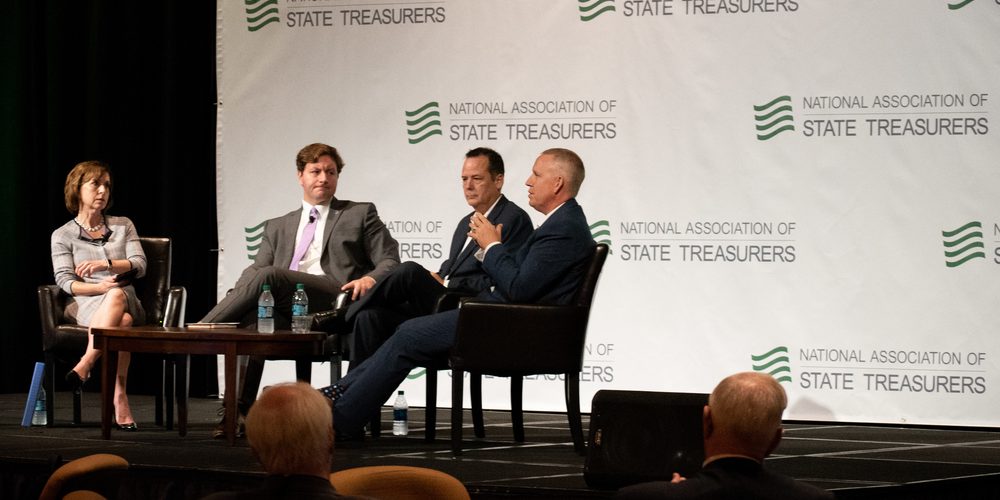Innovators are teaming up with lawmakers and industry leaders to bring real estate and financial services into the 21st century with blockchain technology — the same technology that makes cryptocurrencies possible. Key players attended the National Association of State Treasurers (NAST) Conference in Scottsdale this month to speak about the potential applications of blockchain technology in financial and property transactions.
Three types of computing technology converge to create a blockchain: distributed records, cryptography and smart-contract code, which is code that performs functions and interacts with other code to make decisions as directed by the user.
These technologies have been around for a long time — cryptography has existed in some form for centuries — but about 10 years ago, innovators in the tech industry discovered that all three could be combined to create an “ecosystem” that can validate transactions without the need for a third-party intermediary, such as a bank. Cryptocurrencies were the immediate response, Bitcoin being the most well-known, but there are myriad applications for the technology that have yet to be utilized.
“Digital currencies are types of blockchain applications, and some of the first types, but I think it’s important to understand that these three technologies allow us now to write applications at the ecosystem or the network level,” said Todd Taylor, founder of the Blockchain Research Lab and professor of global operations and supply chains at Arizona State University.
Taylor heads up the technical efforts of RealBlock, a private Arizona-based real estate blockchain company that’s making it cheaper and easier to buy or sell property using a secure distributed ledger to record all transactions and information involved with the sale.
“Being a supply-chain or an operations professor, we talk a lot about value chains: many companies that come together to produce a product or deliver a service,” Taylor said. “That ecosystem of companies that come together to perform tasks together, to partner together, to provide experiences together, to manage some kind of a process together, were now able — with this collection of technologies — to write single applications that all these companies can come together and work upon.”
The type of network system Taylor is describing is considered a private blockchain application, meaning one that can only be accessed by the active participants. In the case of a real estate application, that might include a loan officer, a real estate broker, an appraiser, an inspector or a title company.
“Those are all members of that real estate ecosystem that can come together on a single application to update an asset — a property in this case — and that series of updates to that property can then be tracked immutably or unchangeably throughout its lifecycle, thus lessening our need for attorneys to go investigate property records, encumbrances and liens and other things when we go to sell or buy a property,” Taylor said.
State Representative Jeff Weninger of Arizona’s Legislative District 17 is embracing blockchain technology through new legislation, the most notable being Arizona’s FinTech Sandbox, an environment of limited regulation that allows budding financial technology companies to test their products on the market without a steep barrier to entry.
The next step in creating more broadly-accepted uses for blockchain technology is to educate governments and members of the public about the practical uses for the technology and the security of the ecosystem.
“Here in Arizona, if you’re going to form a business, you have to go to the Corporation Commission, then you have to go to the Secretary of State’s office… and it’s all these different places you have to go,” Weninger said. “The idea that you can go on a computer and it would know to take you where you need to go, but it’s all secure like that, I think it would be incredible.”
One possible application for state governments could be keeping track of unclaimed property, Weninger said. In Arizona, unclaimed property falls under the Department of Administration (DOA) purview, but in many states that responsibility rests on the treasurer’s office.
“You can just automate that whole process and have those assets on a blockchain, and knowing exactly what they are and who they go to, maybe it doesn’t take quite so long,” Weninger said. “Maybe it doesn’t take as much staff time, and maybe the state actually recoups the money.”
The benefit for state governments would be in finding inefficiencies due to overspending or fraud, Weninger said.
Wire fraud associated with real estate transactions is on the rise, and a secure blockchain could make things much more difficult for hackers trying to dupe home buyers, Taylor said.
The FBI counted $19 million in wire-transfer frauds affecting home buyers in fiscal year 2016, according to the Washington Post. In FY 2017, nearly $1 billion was diverted (not always successfully) from real estate purchase transactions to criminal bank accounts.
“So hackers are coming in and they’re creating an email alias that looks like the buyer’s broker’s alias, and they’re duping the buyer into sending the wire transfer to that fraudulent email address instead of to the escrow account at the title company where it belongs,” Taylor said. “That’s one of the things that led us to… completely ignore email and just move right to a blockchain application that identifies members, allows them to participate based upon who they are and then secures the communication of the wire instructions through that secure platform.”
Considering all the possible applications of blockchain technology, advocates are hoping to see templates or other modular applications that can be purchased by companies for pre-defined uses, Taylor said. For now, companies interested in using blockchain are downloading open-source (free) code and hiring developers to build dedicated applications to fit their needs.
“It’s pretty much custom development that’s happening on top of those open-source codebases,” Taylor said. “You can pull the Bitcoin codebase down and use it as a platform upon which you can start to add functionality and write applications. And there’s multiple codebases available in these open-source environments.”
Weninger said he’s already seen the enthusiasm for such a concept from large technology companies in Arizona, namely IBM, a company he says is leading the way to a large-platform blockchain that can be deployed to companies and governments.
“I think you’re going to have a slew of people who are going to focus on smaller businesses and maybe smaller governments and have programs that they can tweak and make directly available to your business,” Weninger said.
















Add comment